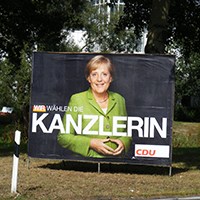HAMBURG, Germany—In the days leading up to Germany’s general elections Sunday, colorful campaign posters seem to be wrapped around every roadside tree trunk and street lamp. The face of Chancellor Angela Merkel, staring straight into the camera with a red blazer and a slight smile, is paired with the words “Kanzlerin für Deutshland,” or our chancellor for Germany. But while international observers are watching Germany during an election that has major implications for Europe and the world, it is not clear whether German voters themselves are sufficiently interested in the stakes to head to the polls at a high rate.
“The main problem isn’t necessarily the decline in voter turnout but the growing social selectivity of electoral processes,” Christina Tillmann, senior project manager at the Bertelsmann Foundation, explained to Trend Lines in an email interview.
Warning that Germany is becoming a divided democracy, Tillmann added that even more significant than the absolute rate of participation is the participation of particular groups. She expects the elections to confirm Germany’s trend of growing social selectivity, noting the possibility of absenteeism among socially disadvantaged groups in particular.

